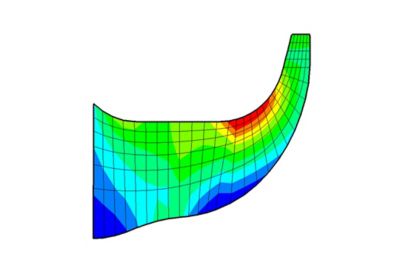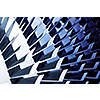Quick Specs
Achieve stronger insight to your rotating machinery design with Ansys Vista TF. This software provides detailed 2D flow simulation and enables you to refine product performance in early design stages.
Ansys empowers the next generation of engineers
Students get free access to world-class simulation software.
Design your future
Connect with Ansys to explore how simulation can power your next breakthrough.
Students get free access to world-class simulation software.
Connect with Ansys to explore how simulation can power your next breakthrough.
Ansys Vista TF is specialized for turbomachinery design and allows you to perform ultra-fast simulations for preliminary designs.
2D throughflow simulation is a critical step in the rotating machinery design process. Vista TF provides you with quick answers and can grant a better insight to your design or expose unexpected issues. Perform initial design iterations in 2D before moving to detailed 3D analysis to reduce development time and engineering resources.

Achieve stronger insight to your rotating machinery design with Ansys Vista TF. This software provides detailed 2D flow simulation and enables you to refine product performance in early design stages.
Lorem Ipsum has been the industry's standard dummy text ever since the 1500s, when an unknown printer took a galley of type and scrambled it to make a type specimen book. It has survived not only five centuries
Engineers use Vista TF to run in-depth, highly iterative analyses to boost design performance.

“All of the work is done within Workbench, facilitating rapid improvements in blade design in a process that is amenable to automatic iteration and optimization.” —PCA
A high-performance turbocharger is a critical component for engine performance. The engineers at PCA were looking for a way to optimize turbocharger performance while simultaneously finding the most efficient approach to their problems. Ansys Vista TF quickly proved to be the best answer, as it offered fast, high-quality answers contained in a streamlined workspace.
Once the first iteration of blades was developed, the PCA engineers simply imported the geometry into Ansys Vista TF 2D throughflow solver. Vista TF quickly provided a solution that allowed engineers to spend more time evaluating performance and make modifications to meet their goals. 2D simulation analysis is often overlooked, but it can be especially important to solve these initial problems before moving to a more comprehensive 3D analysis. The streamlined workspace allotted more time for analysis and helped PCA efficiently develop a robust and cost-effective turbocharger.
Lorem Ipsum has been the industry's standard dummy text ever since the 1500s, when an unknown printer took a galley of type and scrambled it to make a type specimen book. It has survived not only five centuries
Ansys Vista TF quickly calculates inviscid Navier Stokes equations on a 2D meridional surface with empirical correlations for loss, incidence and more. Additionally, Ansys Vista TF’s streamlined workspace allows you to perform quick adjustments to significantly improve early designs.

Boost simulation speed and achieve highly accurate answers to rotating machinery design problems
Incompressible gas and liquids can be used to model fans, pumps and hydraulic turbines.
Real gasses for applications involving refrigerants, steam compressors and other real gas machines.
Visualize blade loading charts, circumferentially averaged meridional vector and contour plots and machine performance quantities.
Ansys Vista TF can handle highly curved walls, curved leading and trailing edges and splitter blades.
Go from a single passage up to multi-stage machines to obtain excellent aerodynamic performance.
Ansys Workbench integration allows you to streamline your turbomachinery workflow from blade design all the way to post-processing and design exploration and parametric studies.
It's vital to Ansys that all users, including those with disabilities, can access our products. As such, we endeavor to follow accessibility requirements based on the US Access Board (Section 508), Web Content Accessibility Guidelines (WCAG), and the current format of the Voluntary Product Accessibility Template (VPAT).
If you're facing engineering challenges, our team is here to assist. With a wealth of experience and a commitment to innovation, we invite you to reach out to us. Let's collaborate to turn your engineering obstacles into opportunities for growth and success. Contact us today to start the conversation.


